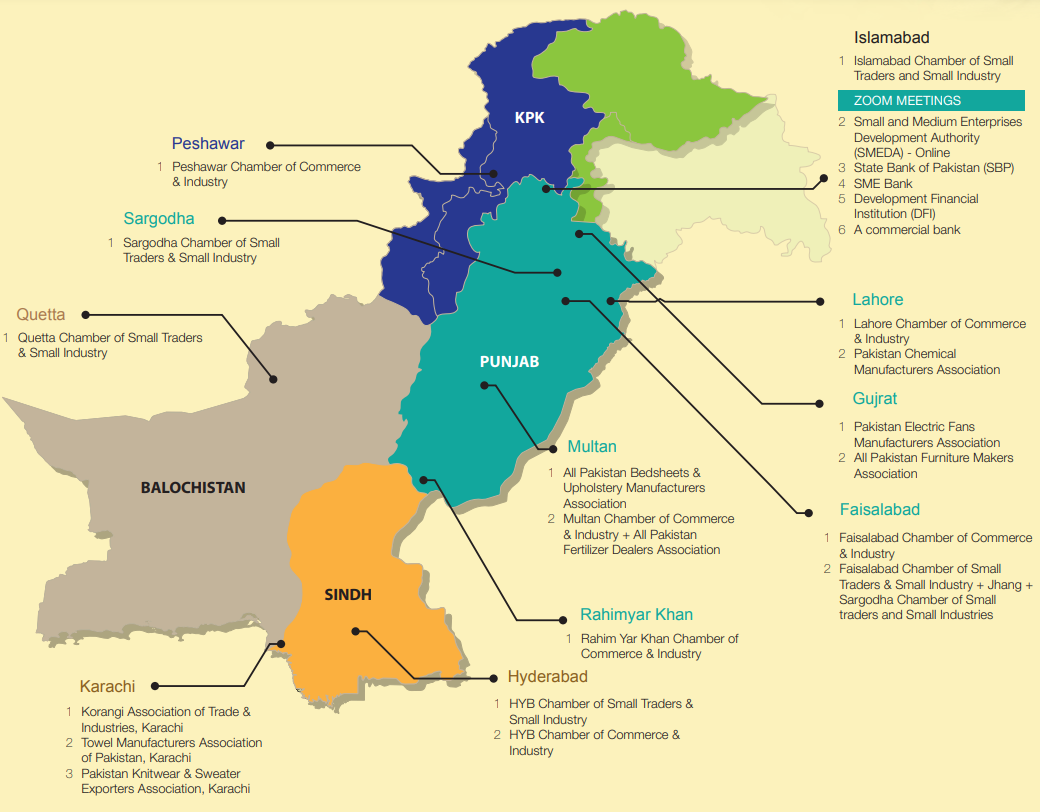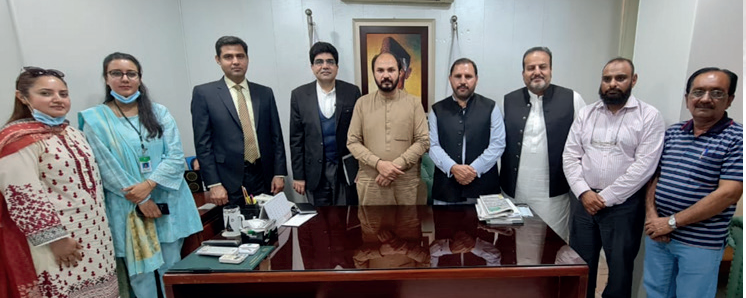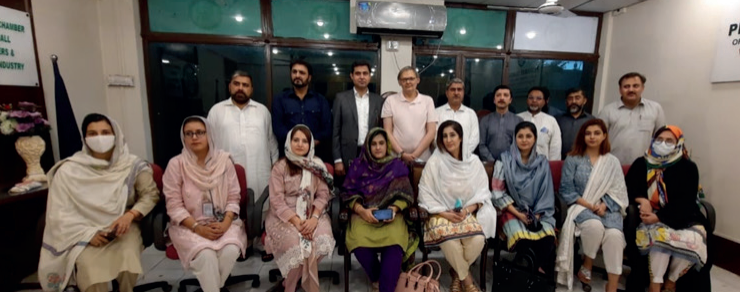Advocacy Sessions with Small & Medium Enterprises (SMEs)
Small & Medium Enterprises (SMEs) are globally identified as the driver of economic growth and
development.
In Pakistan too, SMEs are a backbone of the national economy
Under Section 29(b) of the Act, the Commission is mandated to review policy frameworks
for fostering competition. In December 2020, the Commission focused on preparing policy
recommendations for key stakeholders on improving the economic efficiency of SMEs. In this
regard, data from the State Bank of Pakistan and 50 financial institutions was gathered to
analyse the access to the availability of financial credit and services. Moreover, for a detailed
demand side analysis, a survey methodology was adopted. For extensive data gathering and
interactive discussions, 18 sessions were held with the trade associations and chambers of
small businesses and industries in 11 cities of Pakistan.
Islamabad Chamber of Small Traders & Small Industries (ICSTSI)
ICSTSI is one of the pioneer chambers for the
SME Sector in Pakistan representing the interest
of local traders, markets and small industries of
Islamabad. The session was attended by Malik
Zaheer Ahmed, President, Mr. Muddassar Fiyaz
Chaudhry, Vice President, Muhammad Abu Bakr,
Executive Committee Member & Chairman SMEs,
and Muhammad Iqbal Qureshi, Secretary General
along with sixteen (16) other ICSTSI’s members.
The Commission’s team briefed them about the main provisions of competition law.
The participants candidly discussed the
problems faced by the small and medium
businesses, particularly the small traders. They
complained of the complicated and multiple
taxation system, and exorbitant rents in the federal
territory
All Pakistan Furniture Maker Association (APFMA), Gujrat
The session at APFMA was attended by Mr.
Ali Ansar Ghumman, former Chairman APFMA
& President Gujrat Chamber of Commerce &
Industry, Muhammad Afzal, former Chairman
APFMA, Mr. Moeen Zafar Chaudhry from Pak
Wood Furnishers, Mr. Sufyan Haider, Secretary
General APFMA along with around 20 other
members of the association.
The participants highlighted that the 34%
spike in the industrial inflation post-Covid-19 and
the imposition of a heavy regulatory duty of 25%
on raw copper, posed a big challenge for the
furniture manufacturers. Another concern raised
was the establishment of the industrial estate for
the businesses of Gujrat for which the land was
provided in Sargodha thus making it an unviable
option to move the machinery and manpower to
a distant city.
The representatives of the Gujrat fan industry
present on the occasion complained about the
uncompetitive tenders floated by the government
departments. They alleged that instead of defining
density, thickness or quality, the tenders specified
a certain brand thus restricting competition to a
specific brand and excluding the other market
players. Moreover, they also complained of
excessive pricing by the freight operators.
The participants also suggested introducing
the idea of wood farming on the national level to
meet the high demand for furniture both at the
local and international levels
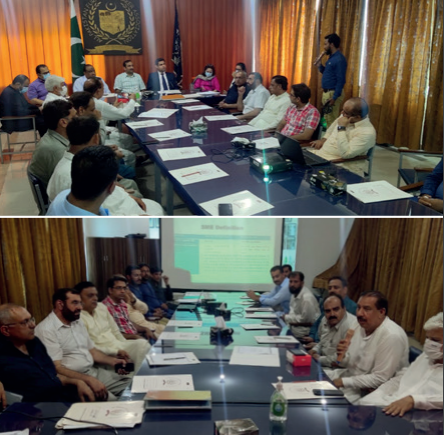
Peshawar Chamber of Small Traders & Small Industries (PCSTSI)
The session was attended by Mr. Adnan
Jalil, president, Mr. Rehman Gul, Senior Vice
President, Mr. Hassan Daud Butt, Chief Executive
Officer, Khyber Pakhtunkhwa Board of Investment
and Trade (KP-BOIT), women entrepreneurs, the
representative of SMEDA, TDAP and members of
the local business community in large number
The participants discussed the problems faced
by SMEs in Peshawar and sought the intervention
of the relevant government departments to resolve
their issues. The participants lauded the role of
SMEDA, BOI and other government agencies in supporting and actively working with the local
business community. They expressed their
concern over the low ratio of SME financing by the
commercial banks, which is stagnating the growth
of SMEs. Stringent requirements of banks have
made it almost impossible for SMEs to avail loans
from banks. Resultantly, they are left with no option
but to get private loans from individual lenders with
heavy markups.
Lahore Chamber of Commerce & Industry (LCCI)
The session at LCCI was attended by Mr.
Sajjad Afzal Sheikh, Executive Committee Member
& Convener SME Committee, Mr. Rehmatullah
Javed, SME National Expert FPCCI, Mr. Abdul
Rafeh Iqbal, Business Manager Intercan Pvt ltd
along with twenty (20) members of the Chamber.
They informed that LCCI provides an
opportunity for its members to involve in
Chamber’s activities and meet government
officials and leading businessmen both Local and
International. LCCI always remains in consultation
with government departments on various issues
related to the business community, which provides
opportunities for members to share their views and
concerns. LCCI’s one window smart services are the benchmark of excellence, where the member
can avail exclusive services about several provincial
and federal authorities.
The representative of the pharmaceutical
sector highlighted that the cost of production
has increased due to higher regulatory duties.
Manufacturers are forced to use local raw material
at higher prices making it equally expensive for the
export market. Likewise, the imposition of 17%
GST is another factor impeding the growth of small
businesses. They also suggested the mapping of
region-wise production capacity across Pakistan
to address the real-time challenges faced by
SMEs.

Pakistan Chemical Manufacturers Association (PCMA), Lahore
The session at PCMA Lahore was attended
by Mr. Iqbal Kidway, Secretary General PCMA,
Mr. Azhar Mian, CEO MZ International, Mr. Abdul
Qayyum, CEO Chromatex, Mr. Mubeen Ahmed,
CSR Engro Polymers, and ten (10) other senior
members. The participants informed that chemicals
are an integral part of almost all industries.
Highlighting the importance of chemicals,
PCMA representatives informed that on daily basis,
consumers buy thousands of chemical products
ranging from household detergents to automotive
paint, fertilizers to crop saving pesticides and
pain-relieving medicines to life-saving drugs
and vaccines. PCMA endeavours to achieve
competitiveness through imports substitution and implementing best practices.
The discussions revealed that the market
size of India’s chemical industry stands at $178
billion whereas Pakistan’s market size is just
$12 billion. The industry is heavily dependent on
imports as the local industry meets only 7% of
total demand. The sector has the export potential
of around $5-10 billion, if paid due attention by the
government. In the absence of any incubators and
facilitators, government support is needed in the
field of Research & Development. Moreover, the
participants stressed the need for documentation
of the retail sector.
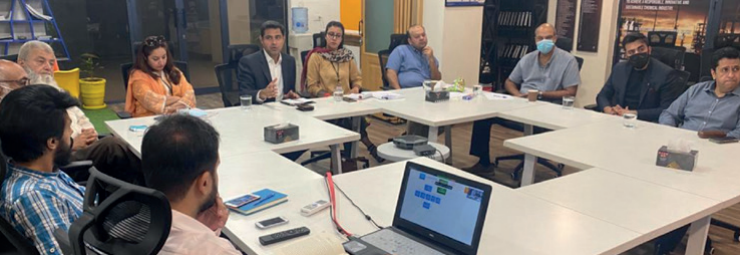
Electric Fan Manufacturers Association (PEFMA), Gujrat
Since 1940s, Gujrat is famous for making
electrical fans and the industry has excelled in
the genre to cater the national and international
demand. According to official data, the Gujrat
district houses 362 electrical fan making units, 137
pottery making units and 784 furniture factories.
The session at the Association was attended
by Mr. Fahad Rafiq, Chairman PEFMA, Mr. Zahid
Mehmood, Vice President, Gulam Mohyuddin,
CEO Khursheed Fans and eleven (11) other
members of the Association.
It was highlighted that small enterprises are
in majority with more than 300 players. The sector
lacks a costing mechanism as it heavily depends
on imported raw material, which fluctuates rapidly
and inconsistently. The sector has huge potential
to generate employment but it requires attention
from the key stakeholders
Certain competition concerns were also
highlighted during the discussions. The participants
complained of predatory pricing, often by the
distributors, which has allegedly resulted in the
shrinking of the industry from 500 to around 200
players at present. As there is a lack of a costing
mechanism, there is a possibility of collusion
among vendors to fix and raise prices. Deceptive
marketing practices are also harming the industry.
It was suggested that industry-wise input targets
may be set to increase the SME’s contribution to
the national economy.
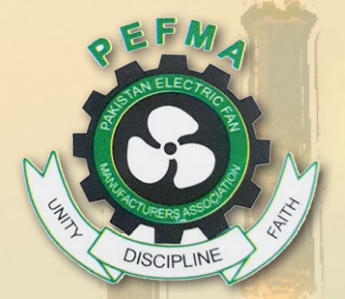
All Pakistan Bedsheets Upholstery Manufacturers Association (APBUMA),
Multan
APBUMA is a leading association having an
active presence in the country with its zonal offices
in Faisalabad, Lahore, Karachi and head office in
Multan. The session at APBUMA was attended by
Khwaja Muhammad Younus, Chairman APBUMA,
Syed Muhammad Fazil, Vice Chairman, Syed
Muhammad Aasim, former Chairman along with
thirty six (36) other members of the association.
The participants brought into notice that in
monetary value, cotton production has largely
decreased from $12 billion to $5 billion mainly due
to multi-crop farming, low-quality seeds, and a tilt
toward sugar cane cultivation. On the contrary,
exports have increased by $25 billion due to
shifting of international orders from India and China. It was stressed that the biggest challenge is
to retain those businesses in Pakistan. Therefore, it
was urged that government should take concrete
steps in this regard.
It was also highlighted that the State Bank of
Pakistan (SBP) frequently held online awareness
sessions about financing facilities. However,
private banks lend according to their own policies
and risk appetite irrespective of credit schemes
offered by SBP. Furthermore, R&D for improving
seed quality is essentially required to enhance per
acre yield. This could lead to an increased income
for farmers as well.
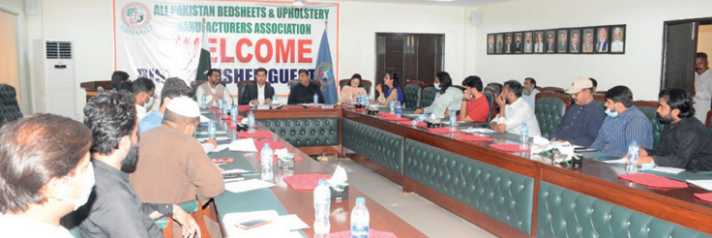
Multan Chamber of Commerce & Industry
MCCI enjoys the singular distinction of
being the premier Chamber of Southern Punjab
representing economic activities due to its location
in the industrial and commercial centre of southern
Punjab. The session at MCCI was attended by Mr.
Iftikhar Ali Shah, Senior Vice President of MCCI,
Khawaja M. Usman, former President and twenty
(20) other members of the chamber.
The discussion highlighted that the agriculture
industry of the region needs to be promoted as it
severely lacks access to state-of-the-art machinery.
For instance, the cotton ginning industry and flour
mills are still working with machinery with only 30-
40% efficiency.
The prominent regions of South Punjab contributing to the national economy are
Multan, Khanewal, Rahim Yar Khan, D.I.Khan,
Muzaffargarh. Therefore, a cluster-based approach
may be adopted by the government to incentivize
their substantive share in the economy.
The participants of the session complained of
an acute shortage of cold storage facilities in the
region. Trade facilitation for the potential exporters
is required to encourage national exports. There is
a sheer lack of implementation of SBP’s financing
schemes for SMEs. Besides R&D issues, complex
taxation, and unnecessary duties on SMEs were
also highlighted during the discussion.

Rahim Yar Khan Chamber of Commerce & Industry (RYKCCI)
The session at RYKCCI was attended by
Chaudhry Azam, Vice President, Malik Ejaz,
Managing Director Swift Sales Distributor, Mr.
Waqas Akram, Managing Director, Waqas Fahd
Flour Mills, Mr. Ghulam Abbas Cheema, Managing
Director Ittefaq Rice Mills, along with fifteen (15)
other members of the chamber.
While addressing the seminar, Chaudhry
Azam said that Rahim Yar Khan is one of the
largest producers of cotton, wheat, sugarcane
and rice, etc. One-third of the mango production
in Pakistan is also produced in the district. There
are over 100 Cotton Ginning Factories, more than
80 Flour Mills, around 100 Oil Mills, 5 Sugar Mills,
3 Textile Units, Power Loom Factories, 2 Fertilizer
Factories, above 150 Seed Companies, more
than 70 Pesticide Firms operating in the region.
The chamber is actively working with institutions
like SMEDA, SBP and FBR. He complained that
the agriculture sector is facing numerous issues
regarding increased prices of fertilizers, tractors
and other associated machinery.
The participants also emphasized the need
to improve Pakistan’s taxation regime and put an
end to under-invoicing. Businesses are reluctant
to register themselves and are afraid to be part of
the tax net of the country. They further added that
the small businesses generally lack proper and
complete documents vice versa banks are hesitant
to lend credit facilities to them.
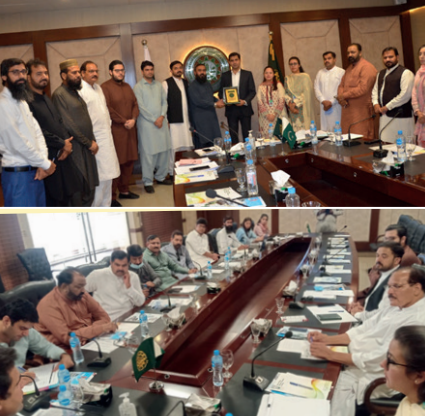
Faisalabad Chamber of Commerce & Industry (FCCI)
The session at FCCI was attended by
Engr. Hafiz Ihtasham Javed, President, Ch. Talat
Mehmood, Senior Vice President, Rana Ayub
Aslam Mani, Vice President, Dr. Habib Aslam
Gaba, Chairman FCCI Standing Committee,
Muhammad Nazir, Secretary General, along with
eighteen (18) other members of the chamber.
The Chamber’s President informed that they
are striving to become a voice of the business
community with a strong pledge to enhance
the economic prosperity and quality of life in
Faisalabad. The Chamber offers various facilitation
to its members ranging from SMEDA, SBP, and
Punjab Board of Investment and Trade (PBIT)
to visa facilitation, E-Police khidmat and several
others.
During the interactive session, the
participants highlighted the increasing power and gas tariffs as one of the major hurdles faced by
the business community. They also complained
about the redundant tax refund system, which is
particularly discouraging the small businesses.
Representatives of the textile exporters, while
sharing their tax-related concerns, suggested
introducing a fixed taxation regime to provide relief
to small businesses.
It was further stressed that Faisalabad being
the second largest industrial hub of Pakistan can
achieve further economic growth, specifically in
the industrial sector, by utilizing the opportunities
available under CPEC. The central location of the
city on the eastern route of CPEC along with its
4500 acres industrial estate located on the main
M-3 motorway provides the ideal conditions for
the setting up of new state-of-the-art industries
through cooperation with Chinese entrepreneurs.

Faisalabad Chamber of Small Traders & Small Industries (FCSTI)
The session at FCSTI was attended by
Mian Zafar Iqbal, CEO, Ch. Shafeeq, President
FCSTI & the Vice President of All Pakistan Flour
Mills Association, Ch. Javed Sadiq, Chairman,
All Pakistan Cotton Power Looms Association,
Muhammad Yousaf, President Faisalabad Gray
Cloth Association, Eng. Bilal Jameel, Senior Vice
Chairman, All Pakistan Bed Sheets & Upholstery
Manufacturers Association, along with forty (40)
other members of the chamber.
The Chamber’s CEO informed that FCSTI
was established in 2013 to maximize its members’
success, the community’s competitiveness and
the area’s economic prosperity.
The participants took a keen interest in the discussion and highlighted that high freight
charges are creating a barrier for exporters. Amid
Covid-19, the freight charges fluctuated drastically
resulting in the decline in the ratio of exports in
the region. Another issue highlighted was the
problems faced by the small businesses while
acquiring land in the industrial estates. It was
recommended that small chambers need to be
engaged on the boards of these industrial estate
and Special Economic Zones (SEZs) so the rights
of SMEs are preserved and ensured. They also
suggested that warehouses should be established
for exporters’ facilitation in foreign countries
while the staff members of embassies should be
sensitized about the export potential. The SMEs
particularly criticized the imposition of 17% GST
on raw material.

Sargodha Chamber of Small Traders & Small Industries (SCST&SI)
The session was attended by Sheikh Asif
Iqbal, founder President, Mr. Amjab Mehmood,
Senior Vice President, Sh. M. Sherdil, Vice
President, along with twenty four (24) members
of the chamber. Most of Sargodha’s economy is
agro-based and the area is famous for producing
the best citrus in Pakistan.
The discussion highlighted that a necessary
condition to enhance labour productivity is the
access and availability of Technical and Vocational
Education and Training (TVET). SMEs do not
have the resources to do so and depend on the
public institutions providing TVET. At the federal
level, National Vocational and Technical Training
Commission (NAVTCC) is the regulatory body
governing TVET. Each province has a provincial
Technical Education and Vocational Training
Authority (TEVTA). The closing down of such
institutions due to lack of funding was specifically
highlighted in the discussion. A deficiency in
skill development has thus resulted in the nonavailability of a trained labour force affecting SMEs’
competitiveness and efficiency. Furthermore, there
is a missing link between the courses taught at
TVET institutes and the actual requirements of the
industry, worsening the requisite skill gap. It was
suggested that steps should be taken on war
footing to tackle the situation in the region.
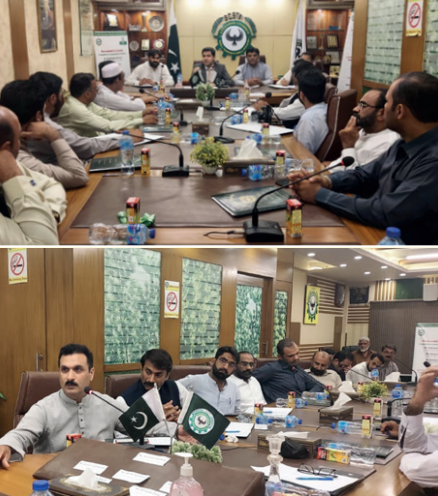
Korangi Association for Trade & Industry (KATI), Karachi
KATI is one of the vibrant trade and leading
industrial associations of Pakistan. It was made
operational in 1970 to represent the commercial
activities of around 10,000 acres of Korangi
Industrial Area. Karachi’s contribution to the
national exchequer is around 65% in which KATI’s
contribution is around 35%.
The session was attended by Mr. Ehtesham
Uddin, former Chairman KATI & chairman of
Standing Committees, Mr. Zaki Ahmed Sharif, Senior Vice President, Ms. Maheen Salman, Senior
Vice President, Ms. Nighat Awan, Vice President
and Mr. Nehal Akhtar, Secretary General along with
other members.
The discussions with KATI members
highlighted the importance of R&D for the
development of SMEs. The national policies
should pay adequate attention to micro and small
businesses. Start-ups should be encouraged
through the provision of incubators and facilitators
Towel Manufacturers Association (TMA), Karachi
The session was attended by Mr. Feroze Alam
Lari, Chairman, Mr. Aamir Hassan Lari, Chairman
(SC), Mr. Muzzammil Husain, Secretary General
along with the members in a large number.
It was highlighted that textile export
constitutes around 60% of the country’s total
export, thus making it one of the prime sectors
that require urgent government support. There
are 162 various laws applicable to SMEs. Ease of
doing business should be introduced to strengthen
the sector. The discussion also pointed toward
missing linkages between industry and academia.
The technical curriculum should be revised
and must include the innovative approaches
adopted worldwide. Specifically, in the aftermath
of Covid-19, e-commerce support is the need of
the hour. Multiple payment gateways should be introduced and a consolidated policy should be
formulated on a priority basis.
Furthermore, the gas pricing issue is a major
barrier to SMEs’ growth and sustainability. With the
current discriminatory natural gas pricing regime
in place, SMEs engaged in the manufacturing
sector on RLNG cannot compete in the market
(as they are charged three times higher prices)
in comparison with the existing players operating
on indigenous natural gas. The discriminatory
gas pricing regime is a major factor responsible
for shrinking industries in Sindh. Thus, it is critical
to resolving the natural gas pricing issue and a
revision in the natural gas pricing mechanism is
therefore proposed such that all market players in
an industry have a level playing field to operate.

Pakistan Knitwear & Sweaters Exporters Association (PKSEA), Karachi
The session was attended by Mr. Rafiq Habib
Godil, Chairman PKSEA, Mr. Saqib, Senior Vice
President of Karachi Chamber of Commerce &
Industry, Mr. Danish Hanif, Chairman Pakistan Yarn
Merchants Association, Mr. Abdur Rauf, Managing
Director Shahzad Apparels along fifteen (15) other
members of the association.
The representative of the Pakistan Yarn
Merchant Association highlighted that in addition
to the complex taxation system, SMEs are also
unable to compete in the market due to various
regulatory duties (RDs) imposed on imports under
applicable Statutory Regulatory Orders (SROs)
issued from time to time. These RDs on the
one hand benefit the large players in the market
upstream, controlling the supply of essential raw
materials, it further gives them discretionary power
to exert in the form of high prices and low quality
on the other. Due to RDs, the SMEs have to
procure raw materials from the local industry at
high prices. Likewise, applicable CDs based on
Harmonized System (HS) Code are such which
are discriminatory and favour some goods under
a certain HS Code against a similar good under
another HS code.
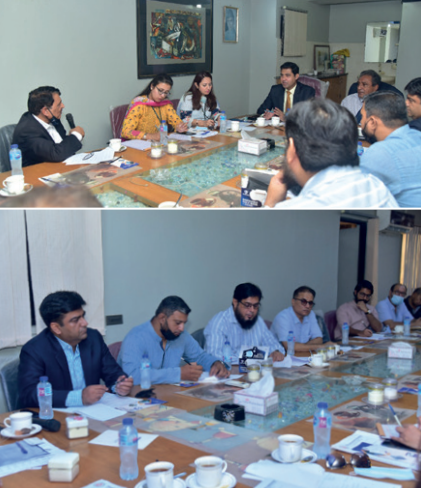
Hyderabad Chamber of Small Traders & Small Industries (HCSTSI)
The session at Hyderabad Chamber of Small
Traders & Small Industries was attended by Mr.
Saleem-ud-Din Qureshi, President, Muhammad
Altaf Memon, Senior Vice President, Muhammad
Yasin Khilji, Convener Sub-Committee SME,
Mr. Daulat Ram Lohana, former President, Mr.
Fahad Hussian, Secretary General, and Mr. Shan
Sehgal, Convener Sub-Committee Banking Affairs
along with twenty two (22) other SME-affiliated
businessmen and industrialists.
The Chamber’s representatives informed
that the Chamber is actively working on Kamyab
Jawan Program and is providing utmost facilitation
to SMEs. The Chamber also conveys the problem
of the business community to the government representatives frequently. While discussing the
hurdles in availing of financing facilities, it was
particularly highlighted that cottage and small
industries are widely neglected. Digitalization
of SMEs is the need of the hour but is severely
lacking. As for SBP’s initiatives amid Covid-19, it
was mentioned that policies formulated during the
pandemic are useful for small traders but those
policies/schemes are not adopted by other banks
thus creating extra hurdles to survive in these
critical times.
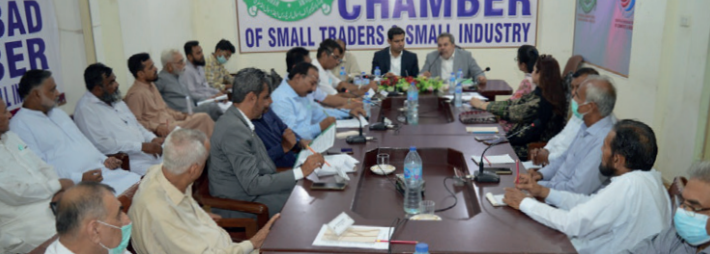
Hyderabad Chamber of Commerce & industry (HYDCCI)
The session was attended by Mr. Fahad
Hussain Shaikh, President HYDCCI, Muhammad
Wasim, Senior Vice President, and Mr. Javed Iqbal,
Chairman Traffic Police Sub Committee along with
other members of the Chamber. On the occasion,
female entrepreneurs were also present in a large
number.
The Chamber is closely working with SMEDA
and TDAP. The speakers suggested that display centers should be established to encourage
women entrepreneurs in the region. Moreover,
training should be given on how to market and
sell their products. Apart from a cumbersome
tax system and excessive documentation, it was
highlighted that commercial banks also require
training regarding SME related schemes and credit
facilities offered by SBP. Their capacity should be
enhanced to ensure ease of doing business.
Quetta Chamber of Small Traders & Small Industries (QCSTSI)
QCSTSI was established in 2013 for the
promotion of the business community of the region.
Prominent industries include dry fruits, handicrafts,
fruits & vegetables, traders, gemstones and many
others. The importance of the area is multifold due
to the proximity to two trading borders of Chaman
and Taftan linking Pakistan with Afghanistan and
Iran.
The session was attended by Mr. Hamdullah
Khan Tareen, Chairman, Mir Murad Baloch, Vice
President, Mr. Asad Khan Noorzai along with
Regional Director TAVTA and businessmen/traders
of Quetta.
The discussions highlighted that due to
the geographical location generally, barter trade
takes place in the region. As banking transactions
are generally avoided by the local and foreign
traders, a seepage of revenue is noticed. Revenue
generation can be increased by curtailing this
aspect along with the creation of free zones at
the border. This will not only generate revenue for
the government but also create employment for
natives. All business activities, including import and
export of perishable items, are mostly executed via
Quetta Dry Port and Chaman and Taftan border
crossings with Afghanistan and Iran, respectively
Exporters stated their concerns about the lack
of storage facilities in the region, which is essential
for the export of fruits from Pakistan. Fruit grading
units and other related facilities are also scarce and
urgently need the government’s support. It was
also noticed that, although most of the business
community is associated with the trading sector,
the region possesses huge potential for marble
processing, chromite processing, livestock and
fisheries-related industries.



